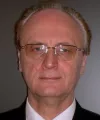
Prof. Dr. Balázs Csaba
Endokrinológus
A Budai Endokrinközpont specialistája "endokrinológia" témakörben
Kérem, tegye fel kérdéseit, készséggel válaszolok Önnek! Bizalmát köszönöm!
Endokrinológus
A Budai Endokrinközpont specialistája "endokrinológia" témakörben
Kérem, tegye fel kérdéseit, készséggel válaszolok Önnek! Bizalmát köszönöm!
Témakörök ►
Kérdezz-felelek
Kérdezni a gomb megnyomásával tudsz, amennyiben a napi kérdések száma még nem haladta meg a napi limitet.
Tisztelt Professzor Úr!
Kb. 3 évvel ezelőtt fordultam Önhöz a panaszaimmal. A leleteim és a fennálló panaszaim alapján Ön autoimmun thyreoditist állapított meg és a beállított gyógyszereimet (Letrox, sz.e. Concor) rendszeres kontrollal ellenőrizte. A kontrollok alkalmával minden alkalommal felhívta a figyelmemet a jód kerülésére, a szervetlen jód kártékony (gyulladást növelő) hatására, mivel az én esetemben az autoimmun folyamatot feltehetően nagy dózisú jód indukálta. Miután érintett lettem a témában, megpróbáltam utána nézni a szervetlen jód pajzsmirigy hormonjaira és magára, a pajzsmirigy működésére gyakorolt hatásának, de nem igazán találtam róla információt. Élve a kérdezés lehetőségével a következő kérdéseket szeretném feltenni T. Professzor Úrnak: 1. A szervetlen jód milyen mechanizmus által módosítja a pajzsmirigy működését, valamint az elégtelen T4-T3(-rT3) átalakulásban részt vesz-e? 2. Érdeklődöm továbbá afelől, hogy a pajzsmirigy problémámat (autoimmun thyreoditis, subklinikus euthyreoid st.)tekintve van-e esélyem arra, hogy az autoimmun gyulladás idővel "kihűl", azaz a T4 pótlás szükségtelenné válik a továbbiakban?
Megtisztelő válaszát előre is köszönöm!
Tisztelettel:
M.Tünde
Kb. 3 évvel ezelőtt fordultam Önhöz a panaszaimmal. A leleteim és a fennálló panaszaim alapján Ön autoimmun thyreoditist állapított meg és a beállított gyógyszereimet (Letrox, sz.e. Concor) rendszeres kontrollal ellenőrizte. A kontrollok alkalmával minden alkalommal felhívta a figyelmemet a jód kerülésére, a szervetlen jód kártékony (gyulladást növelő) hatására, mivel az én esetemben az autoimmun folyamatot feltehetően nagy dózisú jód indukálta. Miután érintett lettem a témában, megpróbáltam utána nézni a szervetlen jód pajzsmirigy hormonjaira és magára, a pajzsmirigy működésére gyakorolt hatásának, de nem igazán találtam róla információt. Élve a kérdezés lehetőségével a következő kérdéseket szeretném feltenni T. Professzor Úrnak: 1. A szervetlen jód milyen mechanizmus által módosítja a pajzsmirigy működését, valamint az elégtelen T4-T3(-rT3) átalakulásban részt vesz-e? 2. Érdeklődöm továbbá afelől, hogy a pajzsmirigy problémámat (autoimmun thyreoditis, subklinikus euthyreoid st.)tekintve van-e esélyem arra, hogy az autoimmun gyulladás idővel "kihűl", azaz a T4 pótlás szükségtelenné válik a továbbiakban?
Megtisztelő válaszát előre is köszönöm!
Tisztelettel:
M.Tünde
Tisztelt M. Tünde!
Kérdése aktuális most is! A jövő hónap elején az endokrinológus szakorvosoknak fogok erről a témáról továbbképző előadást tartani. A legaktuálisabb témákat tartalmazza az alábbi két összefoglaló, sajnos a fordításra nincs időm.
Azt a korábbiakban is írtam, hogy a folyamat megnyugodhat, ha megfelelő kezelésben és gondozásban részesül a beteg.
Jó egészséget kívánok, tisztelettel:
I. Int. J. Mol. Sci. 2014, 15, 12895-12912; doi:10.3390/ijms150712895
International Journal of
Molecular Sciences
ISSN 1422-0067
http://www.mdpi.com/journal/ijms
Review
Iodine Excess as an Environmental Risk Factor for
Autoimmune Thyroid Disease
Yuqian Luo 1, Akira Kawashima 1, Yuko Ishido 1, Aya Yoshihara 1, Kenzaburo Oda 1,
Naoki Hiroi 2, Tetsuhide Ito 3, Norihisa Ishii 4 and Koichi Suzuki 1,*
1 Laboratory of Molecular Diagnostics, Department of Mycobacteriology, Leprosy Research Center,
National Institute of Infectious Disease, 4-2-1 Aoba-cho, Higashimurayama-shi, Tokyo 189-0002,
Japan; E-Mails: yuqianluo31@gmail.com (Y.L.); akirak@jichi.ac.jp (A.K.);
yishido@nih.go.jp (Y.I.); aya.yoshihara@med.toho-u.ac.jp (A.Y.);
kenzaburou.oda@med.toho-u.ac.jp (K.O.)
2 Department of Education Planning and Development, Faculty of Medicine, Toho University,
Tokyo 143-8540, Japan; E-Mail: n-hiroi@med.toho-u.ac.jp
3 Department of Medicine and Bioregulatory Science, Kyushu University, 3-1-1 Maidashi,
Higashi-ku, Fukuoka 812-8582, Japan; E-Mail: itopapa@intmed3.med.kyushu-u.ac.jp
4 Leprosy Research Center, National Institute of Infectious Disease, 4-2-1 Aoba-cho,
Higashimurayama-shi, Tokyo 189-0002, Japan; E-Mail: norishii@nih.go.jp
* Author to whom correspondence should be addressed; E-Mail: koichis@me.com;
Tel.: +81-42-391-8211; Fax: +81-42-394-9092.
Received: 19 June 2014; in revised form: 3 July 2014 / Accepted: 15 July 2014 /
Published: 21 July 2014
Abstract: The global effort to prevent iodine deficiency disorders through iodine
supplementation, such as universal salt iodization, has achieved impressive progress during
the last few decades. However, iodine excess, due to extensive environmental iodine
exposure in addition to poor monitoring, is currently a more frequent occurrence than
iodine deficiency. Iodine excess is a precipitating environmental factor in the development
of autoimmune thyroid disease!!!!. Excessive amounts of iodide have been linked to the
development of autoimmune thyroiditis in humans and animals, while intrathyroidal
depletion of iodine prevents disease in animal strains susceptible to severe thyroiditis.
Although the mechanisms by which iodide induces thyroiditis are still unclear, several
mechanisms have been proposed: (1) excess iodine induces the production of cytokines and
chemokines that can recruit immunocompetent cells to the thyroid; (2) processing excess
iodine in thyroid epithelial cells may result in elevated levels of oxidative stress, leading to
OPEN ACCESS
Int. J. Mol. Sci. 2014, 15 12896
harmful lipid oxidation and thyroid tissue injuries; and (3) iodine incorporation in the
protein chain of thyroglobulin may augment the antigenicity of this molecule. This review
will summarize the current knowledge regarding excess iodide as an environmental
toxicant and relate it to the development of autoimmune thyroid disease.
Keywords: excess iodine; autoimmune thyroid disease; environmental toxicant; immune
response; tissue injury; thyroglobulin
II. Review Article
Effects of Increased Iodine Intake on Thyroid Disorders
Xin Sun, Zhongyan Shan, Weiping Teng
Department of Endocrinology and Metabolism, Institute of Endocrinology, Liaoning Provincial Key Laboratory of Endocrine Diseases, The First Affiliated Hospital of China Medical University, Shenyang, China
Iodine is a micronutrient essential for the production of thyroid hormones. Iodine deficiency is the most common cause of preventable mental impairment worldwide. Universal salt iodization (USI) has been introduced in many countries as a cost-effective and sustainable way to eliminate iodine deficiency disorders for more than 25 years. Currently, the relationship between USI and iodine excess has attracted more attention. Iodine excess can lead to hypothyroidism and autoimmune thyroiditis, especially for susceptible populations with recurring thyroid disease, the elderly, fetuses, and neonates!!!!. Nationwide USI was introduced in China in 1996. This review focused on the effects of iodine excess worldwide and particularly in China.
Prof. Dr. Balázs Csaba
2014-11-08 13:33:51
Kérdése aktuális most is! A jövő hónap elején az endokrinológus szakorvosoknak fogok erről a témáról továbbképző előadást tartani. A legaktuálisabb témákat tartalmazza az alábbi két összefoglaló, sajnos a fordításra nincs időm.
Azt a korábbiakban is írtam, hogy a folyamat megnyugodhat, ha megfelelő kezelésben és gondozásban részesül a beteg.
Jó egészséget kívánok, tisztelettel:
I. Int. J. Mol. Sci. 2014, 15, 12895-12912; doi:10.3390/ijms150712895
International Journal of
Molecular Sciences
ISSN 1422-0067
http://www.mdpi.com/journal/ijms
Review
Iodine Excess as an Environmental Risk Factor for
Autoimmune Thyroid Disease
Yuqian Luo 1, Akira Kawashima 1, Yuko Ishido 1, Aya Yoshihara 1, Kenzaburo Oda 1,
Naoki Hiroi 2, Tetsuhide Ito 3, Norihisa Ishii 4 and Koichi Suzuki 1,*
1 Laboratory of Molecular Diagnostics, Department of Mycobacteriology, Leprosy Research Center,
National Institute of Infectious Disease, 4-2-1 Aoba-cho, Higashimurayama-shi, Tokyo 189-0002,
Japan; E-Mails: yuqianluo31@gmail.com (Y.L.); akirak@jichi.ac.jp (A.K.);
yishido@nih.go.jp (Y.I.); aya.yoshihara@med.toho-u.ac.jp (A.Y.);
kenzaburou.oda@med.toho-u.ac.jp (K.O.)
2 Department of Education Planning and Development, Faculty of Medicine, Toho University,
Tokyo 143-8540, Japan; E-Mail: n-hiroi@med.toho-u.ac.jp
3 Department of Medicine and Bioregulatory Science, Kyushu University, 3-1-1 Maidashi,
Higashi-ku, Fukuoka 812-8582, Japan; E-Mail: itopapa@intmed3.med.kyushu-u.ac.jp
4 Leprosy Research Center, National Institute of Infectious Disease, 4-2-1 Aoba-cho,
Higashimurayama-shi, Tokyo 189-0002, Japan; E-Mail: norishii@nih.go.jp
* Author to whom correspondence should be addressed; E-Mail: koichis@me.com;
Tel.: +81-42-391-8211; Fax: +81-42-394-9092.
Received: 19 June 2014; in revised form: 3 July 2014 / Accepted: 15 July 2014 /
Published: 21 July 2014
Abstract: The global effort to prevent iodine deficiency disorders through iodine
supplementation, such as universal salt iodization, has achieved impressive progress during
the last few decades. However, iodine excess, due to extensive environmental iodine
exposure in addition to poor monitoring, is currently a more frequent occurrence than
iodine deficiency. Iodine excess is a precipitating environmental factor in the development
of autoimmune thyroid disease!!!!. Excessive amounts of iodide have been linked to the
development of autoimmune thyroiditis in humans and animals, while intrathyroidal
depletion of iodine prevents disease in animal strains susceptible to severe thyroiditis.
Although the mechanisms by which iodide induces thyroiditis are still unclear, several
mechanisms have been proposed: (1) excess iodine induces the production of cytokines and
chemokines that can recruit immunocompetent cells to the thyroid; (2) processing excess
iodine in thyroid epithelial cells may result in elevated levels of oxidative stress, leading to
OPEN ACCESS
Int. J. Mol. Sci. 2014, 15 12896
harmful lipid oxidation and thyroid tissue injuries; and (3) iodine incorporation in the
protein chain of thyroglobulin may augment the antigenicity of this molecule. This review
will summarize the current knowledge regarding excess iodide as an environmental
toxicant and relate it to the development of autoimmune thyroid disease.
Keywords: excess iodine; autoimmune thyroid disease; environmental toxicant; immune
response; tissue injury; thyroglobulin
II. Review Article
Effects of Increased Iodine Intake on Thyroid Disorders
Xin Sun, Zhongyan Shan, Weiping Teng
Department of Endocrinology and Metabolism, Institute of Endocrinology, Liaoning Provincial Key Laboratory of Endocrine Diseases, The First Affiliated Hospital of China Medical University, Shenyang, China
Iodine is a micronutrient essential for the production of thyroid hormones. Iodine deficiency is the most common cause of preventable mental impairment worldwide. Universal salt iodization (USI) has been introduced in many countries as a cost-effective and sustainable way to eliminate iodine deficiency disorders for more than 25 years. Currently, the relationship between USI and iodine excess has attracted more attention. Iodine excess can lead to hypothyroidism and autoimmune thyroiditis, especially for susceptible populations with recurring thyroid disease, the elderly, fetuses, and neonates!!!!. Nationwide USI was introduced in China in 1996. This review focused on the effects of iodine excess worldwide and particularly in China.
Prof. Dr. Balázs Csaba
2014-11-08 13:33:51
Olvasói értékelés: nincs még értékelés











